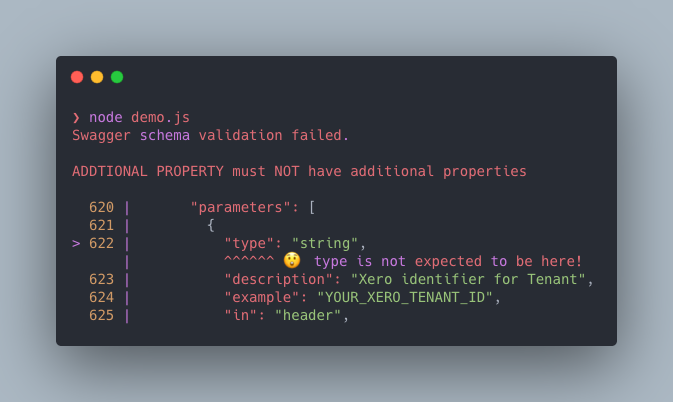README
OpenAPI 3.x or Swagger 2.0? YAML or JSON? URL, path, string or object? Who cares! It just works.
This module uses a bunch of other great modules to do the heavy lifting, and normalizes everything!
Install
npm install oas-normalize --save
Usage
It's pretty simple:
const OASNormalize = require('oas-normalize');
const oas = new OASNormalize(
// Or a string, pathname, JSON blob, whatever
'https://raw.githubusercontent.com/OAI/OpenAPI-Specification/master/examples/v3.0/petstore-expanded.yaml'
);
oas.validate().then(definition => {
// Definition will always be JSON, and valid.
console.log(definition);
}).catch(err => {
console.log(err);
});
Errors
For validation errors, when available, you'll get back an object:
{
"details": [
// Ajv pathing errors. For example:
/* {
"instancePath": "/components/securitySchemes/tlsAuth",
"schemaPath": "#/properties/securitySchemes/patternProperties/%5E%5Ba-zA-Z0-9%5C.%5C-_%5D%2B%24/oneOf",
"keyword": "oneOf",
"params": { "passingSchemas": null },
"message": "must match exactly one schema in oneOf"
}, */
]
}
message is almost always there, but path is less dependable.
Helper Functions
Note: All of these functions are promise-driven.
If you want some more functionality, you can do anything here:
| Function | What it does |
|---|---|
.load() |
Just load the file, valid or not, as JSON |
.bundle() |
Bring together all files into one JSON blob (but retain $ref pointers) |
.deref() |
Resolve $ref pointers |
.validate([convertToLatest?]) |
Validate the whole thing! |
Other Little Features
Always Return OpenAPI 3.x
If you want .validate to always return an OpenAPI 3.x definition, supply true as its argument:
OASNormalize.validate(true).then(...);
Enable Local Paths
For security reasons, you need to opt into allowing fetching by a local path. To enable it supply the enablePaths option to the class instance:
const oas = new OASNormalize('./petstore.json', { enablePaths: true })
Colorized errors
If you wish errors from .validate() to be styled and colorized, supply colorizeErrors: true to your instance of OASNormalize:
const oas = new OASNormalize('https://example.com/petstore.json', {
colorizeErrors: true,
})
Error messages will look like such:


